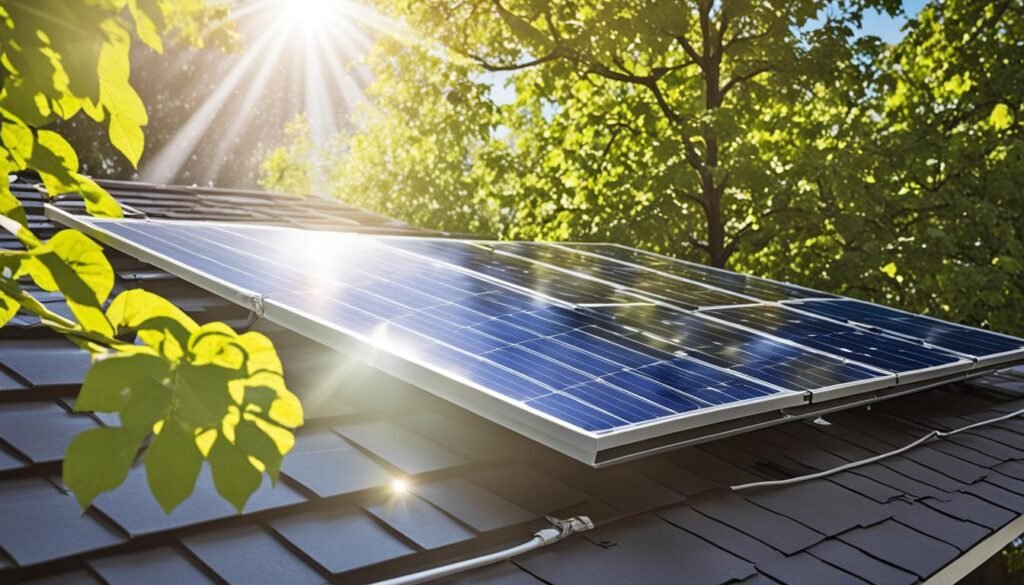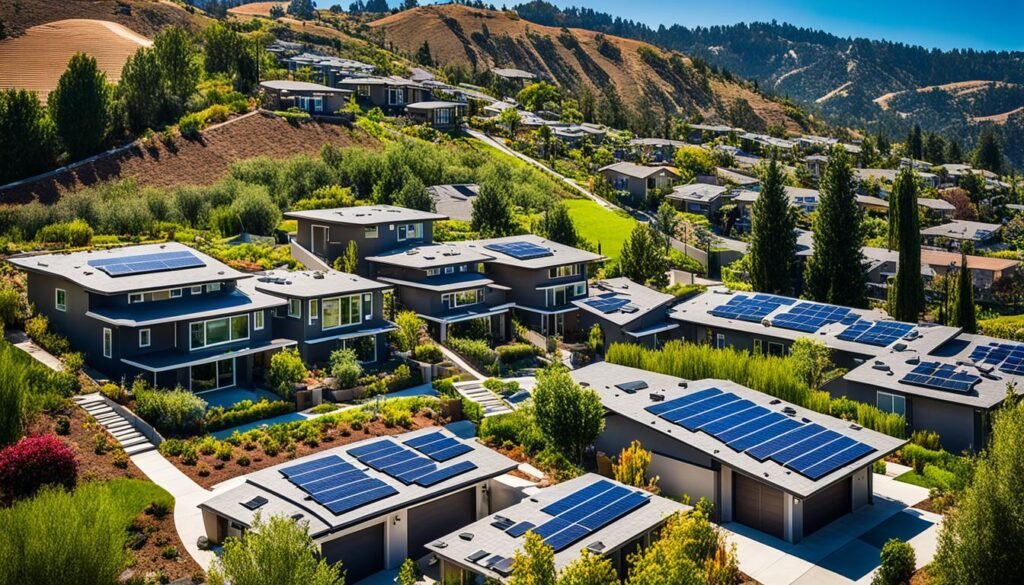Have you ever wondered how much value solar panels can actually add to your home?
Solar panel efficiency isn’t just good for the environment. It’s also a smart financial choice. Homes with solar energy systems enjoy benefits. These include higher property values and big savings over time. Maximizing solar panel output can increase your home’s value by about 4.1%. In sunny states, the benefits are even greater.
For the best results, it’s vital to choose high-quality systems and keep them well-maintained. Thinking about solar panels? Now’s the perfect time to get started. Learn how boosting solar panel efficiency can improve your home’s value and save you money in the future.
Key Takeaways
- Solar panels can increase home value by a median of 4.1%.
- Solar-friendly states offer instant savings and higher ROI.
- Investing in quality systems and regular upkeep is crucial.
- Higher solar panel efficiency leads to significant long-term savings.
- Superior solar energy systems enhance overall property appeal.
Introduction to Solar Panel Efficiency
Solar panel efficiency is key for those wanting energy freedom and lower bills. Diving into solar power reveals that efficiency is more than panel installation. It embraces sustainable living and informed choices to boost performance.
Here are some tips for higher solar panel efficiency to make our homes eco-friendly:
- Regular maintenance to ensure optimal performance.
- Keeping panels clean to prevent energy loss from dirt and debris.
- Properly positioning panels to capture maximum sunlight.
Many factors affect the efficiency of solar power systems. These include installation quality and care. Applying these tips for higher solar panel efficiency helps us save money. It also aids in protecting the environment.
Improving solar power efficiency leads to major savings. It also supports our sustainable living commitment. This guide highlights the value of efficiency in solar technology. It prepares us to make our energy systems more effective and green.
Choosing the Right Solar Panels
Choosing the right solar panel type is key to more efficient energy. We’ll look into two main kinds: monocrystalline and polycrystalline panels. Their efficiency, life span, and warranties greatly affect solar panel performance.
Types of Solar Panels: Monocrystalline vs. Polycrystalline
Knowing the difference between monocrystalline and polycrystalline panels is crucial. Monocrystalline panels, made from a single silicon crystal, are more efficient and perform better in low light. They cost more but are worth it in the long run.
Polycrystalline panels come from many silicon crystals. They’re not as efficient as monocrystalline panels but are cheaper. Yet, they still deliver reliable performance.
| Feature | Monocrystalline Silicon Panels | Polycrystalline Silicon Panels |
|---|---|---|
| Efficiency | High | Moderate |
| Cost | Higher | Lower |
| Longevity | 25-30 years | 20-25 years |
| Performance in Low-Light | Excellent | Good |
Panel Warranties and Longevity
Warranties and longevity are huge factors in your solar investment. Top-tier solar panels often have 25 to 30-year warranties. This shows the trust makers have in their products. Choosing well-known brands with solid warranties is smart.
With the right care, these panels can work up to 40 years. This makes them a smart investment for the future.
Properly Sizing Your Solar System
It’s crucial to make sure your solar system fits your home’s energy needs. This means analyzing how much energy you use and talking to solar experts. Doing this helps maximize how well your solar panels work.
Assessing Household Energy Usage
Start by figuring out how much energy your home uses with an energy usage assessment. Look at your electricity bills from the last year. This shows how your energy needs change with the seasons.
Understanding your energy usage helps you see how much power you need. With this info, you can make sure your solar system is the right size. This stops you from getting a system that’s too small or spending on one that’s too big.
Consulting with Professional Installers
After you know your energy usage, talk to solar system professional installers. They know how to make a system that’s just right for your house. They help you get the most out of your solar panels.
These experts use special tools to figure out how much solar power your house can get. Their knowledge helps make your solar system as efficient and cost-effective as possible.
Optimizing the Orientation and Angle of Panels
Getting the most from solar energy means setting your panels just right. If you’re in the Northern Hemisphere, go for a south-facing setup. It really boosts your panel’s productivity. Yet, finding the best angle depends on where you are. You might need to tweak it as seasons change.
To really kick up your system’s power, get the orientation of your panels right. You may need help from experts who know your area well. They’ll get the angle and direction perfect. This not only ups your energy collection but also keeps your system running strong for years.
- Proper solar panel orientation gives you the most sunlight.
- A great angle comes from working with experts.
- Adjusting your setup often keeps it at its best.
Choosing the best position and tilt for your solar panels is worth it. You’ll see better performance and save more on energy. This makes your solar project a wise choice.
Keeping Your Solar Panels Clean
It’s important to keep your solar panels clean to get the most energy from them. Dirt and debris can block sunlight, lowering energy production. So, solar panel maintenance should be part of your regular cleaning routine.
Cleaning Methods for Solar Panels
To clean solar panels, you can start with a simple garden hose rinse. This gets rid of dust and loose stuff. If there’s tough dirt, mild soap and a soft brush work well. But, don’t use harsh stuff that can scratch. Always check the maker’s advice to avoid damage.
Scheduling Regular Maintenance
Keeping your solar system in top shape is key. Aim to have a pro check it once a year. They’ll look for any issues, make sure everything works right, and clean it well. This keeps your system running well and lasting longer.
| Cleaning Frequency | Method | Reason |
|---|---|---|
| Monthly | Rinsing with hose | To remove dust and loose debris |
| Quarterly | Soapy water and soft brush | For eliminating grime and bird droppings |
| Yearly | Professional maintenance | Complete system check and thorough cleaning |
Sticking to a regular solar panel maintenance plan and using the right cleaning methods ensure our solar panels work their best.
Minimizing Shading on Your Panels
For those of us with solar panels, maximizing energy production is crucial. Yet, shade on our panels can greatly reduce how well they work. To keep our solar panels clear of shade, we need good placement and consistent upkeep.
Pruning nearby trees and making sure no new structures shadow our panels are key to avoiding shade. This keeps our panels working well.

Here are some important steps to keep our solar panels running efficiently:
- Regularly evaluate the positioning of our solar panels throughout the year, considering seasonal changes in the sun’s path.
- Implement professional assessments to analyze potential shading issues before they impact energy production.
- Employ technologies such as micro-inverters or power optimizers to minimize the shade impact on solar efficiency if unavoidable shading occurs.
By being proactive, we ensure our solar panels give us the most energy all year long.
Using Energy-Efficient Appliances
Adding energy-efficient appliances to our homes complements solar energy systems. This helps cut down on how much power we use.
ENERGY STAR Certified Appliances
Opting for appliances with the ENERGY STAR label is a smart way to save energy at home. These appliances meet strict rules for energy efficiency from the U.S. Environmental Protection Agency. This means they perform well while using less electricity.
Among these, you’ll find fridges, washing machines, and dishwashers. They’re built to be more efficient than those without certification.
Smart Thermostats and LED Lighting
Smart thermostats and LED lighting also boost a home’s energy efficiency. Smart thermostats adapt to our temperature likes and automatically change settings to save energy. This way, we stay comfy without using too much power.
LED lighting, on the other hand, uses much less electricity and lasts longer than old-style bulbs. It’s an excellent option for lighting up both inside and outside our homes.
By choosing energy-efficient appliances and innovative technologies like smart thermostats and LED lights, we improve our home’s energy use. Plus, we make the most of our solar investments. This leads to a greener, more budget-friendly lifestyle.
Generating and Utilizing Solar Power Wisely
Understanding the balance between solar power generation and use is key. Knowing when and how to use our solar energy can lower our electricity bills. It can also make our solar systems last longer.
Using solar energy smartly involves choosing the right time for using appliances. For example, run dishwashers and washing machines when the sun is strongest. This way, we use more solar energy and less from the grid.

Energy monitoring systems also play a big role. They show us how we use energy in real-time. With this info, we can align our energy use with how much solar power we generate.
Investing in smart home tech can also improve our solar energy use. Devices like smart thermostats adjust home temperatures automatically. They ensure we use energy efficiently without having to change settings ourselves.
By following these tips, we make the most out of our solar panels financially while living sustainably. Efficient solar energy use means generating and using power in the smartest way possible. This ensures the best return on our investment.
Financial Incentives and Rebates
Investing in solar panels is more than a technical move. It’s a smart financial decision, offering many money-saving benefits. By understanding federal solar tax benefits, state and local solar cash-back offers, and policies for selling extra energy, you can save a lot of money. Let’s dive into these financial programs to get the most out of solar energy.
Federal Solar Tax Incentives
Federal tax benefits help lower the cost of getting solar panels. Homeowners get to deduct a part of the cost from their federal taxes. This makes solar power more reachable and attractive. It cuts down the initial expenses, speeding up your savings on energy costs.
State and Local Solar Rebates
On top of federal help, some states and cities offer extra solar rebates. These offers vary by location but aim to cut down installation costs. Using these rebates can significantly lower your spending, making solar power even more budget-friendly.
Net Metering Policies
Net metering policies offer a key way to save money with solar. They let homeowners sell extra solar power back to the electric company, often at full retail rates. This not only encourages smart use of solar energy but also lets you earn money, making your solar investment even better.
By combining federal benefits, state and local rebates, and net metering, you can see big savings. Let’s check out their advantages in a table:
| Incentive Type | Benefit | Impact on Investment |
|---|---|---|
| Federal Solar Tax Incentives | Reduces tax liability by a percentage of the installation cost | Decreases upfront costs, boosting affordability |
| State and Local Solar Rebates | Grants or reimbursements from state or local authorities | Further reduces installation expenses |
| Net Metering Policies | Selling excess energy back to the grid | Creates ongoing revenue from energy production |
Understanding and using these solar policies well can really help homeowners make the most of their solar investments and ongoing energy savings.
Solar Panel Efficiency
Making solar panel systems better is key to saving more energy sustainably. When we mix high-efficiency solar solutions with the best ways of doing things, we get solar installations that perform better and last longer.
Keeping solar solutions working well involves regular upkeep. By cleaning and checking our panels on schedule, we make sure they work as well as possible. This keeps them clear of dirt and things that could make them less efficient.
“A well-maintained solar panel system ensures sustainable energy savings.”
Avoiding shadows is also very important. Shadows from trees, buildings, and other obstacles can lower the power we get. We must look closely at each site to find the best place for our panels.
We also have to pick the best solar parts. Top-quality solar products usually come from trusted makers. They offer strong guarantees and help, which keeps our investment safe and pays off over time.
Here’s a look at what’s important to keep solar panel efficiency up:
| Aspect | Best Practice | Outcome |
|---|---|---|
| Regular Maintenance | Scheduled cleaning and inspections | Prolongs panel lifespan and maintains efficiency |
| Shading Avoidance | Strategic panel placement | Maximizes sunlight exposure |
| Quality Components | Invest in reputable brands | Ensures reliable performance and support |
By sticking to these best practices, we make our solar panel systems much better. This way, we not only save energy in a big way but also use smart, research-based methods. Our commitment to quality makes our solar investments far more efficient.
Conclusion
We have looked at many ways to make solar panels work better. We now see the big pluses of choosing solar power. By picking the right panels and setting them up well, we save money and become more energy-independent.
Using solar panels is not just about lower bills. It’s also about living in a way that helps the Earth. When we pair solar panels with smart, energy-saving devices, we can save even more.
The cost of solar panels might seem high at first. But, the benefits in the long run, like a higher home value and tax breaks, make it a smart choice. By using these solar tips, we all take steps toward a greener future. This future has less pollution and more energy savings.


